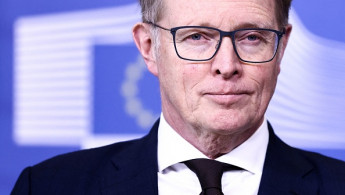Europe's new Frontex border chief promises 'no more pushbacks' of refugees
The EU border agency Frontex has pledged to end its pushbacks of refugees, in a bid to shore up its credibility following a series of scandals.
Speaking at a press conference on Thursday, incoming director Hans Leijtens, a member of the Netherlands armed forces, said that "border management and fundamental rights" will go "hand in hand".
Leijtens will take office on 1 March, with promises to clean up the border agency's tarnished image after the dangerous and sometimes lethal pushback of refugees by its agents in European waters.
A "pushback" constitutes any action taken by a state that "result(s) in migrants, including asylum seekers, being summarily forced back to the country from where they attempted to cross", according to the UN Commissioner for Human Rights.
The EU has been accused of othering no other option for refugees seeking safety in Europe, forcing them back across the Aegean and Mediterranean seas in unsuitable boats.
One of the most handsomely funded EU bodies, Frontex has been implicated in human rights abuses, due to migrant deaths at sea caused by such pushbacks, since its inception in 2004.
Frontex has been accused by NGOs of sharing data and coordinating "rescues" with the Libyan Coast Guard, despite widespread knowledge of human trafficking and inhumane detention conditions for migrants in Libya.
Last year, there were accusations that agents had been deliberately ignoring illegal pushbacks of migrants at several entry points in Europe.
An investigation by The New Arab found that Frontex also systematically delays Freedom of Information requests to frustrate the work of investigative journalists.
Nearly 50 percent of all FOI requests get rejected by Frontex, while many more face delays and obscure working processes.
Frontex was described as having "a minimalist interpretation of their transparency obligations", by media expert Luděk Stavinoha.
As incoming chief, Leijtens has promised that he will not be "the type of director who will build a fence around Frontex", promising to "open the doors" to allow for greater transparency.





 Follow the Middle East's top stories in English at The New Arab on Google News
Follow the Middle East's top stories in English at The New Arab on Google News


